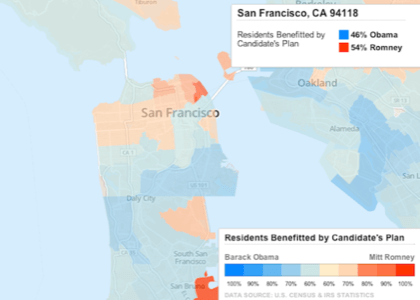
Politify is a recently launched web application that uses IRS and Census data to show a simulation of how President Obama and Mitt Romney’s economic plans will impact areas of the country by zip code, even allowing users to zoom in on their own neighborhood.
Last year, during primary season, Politify began as a web app that offered a simple way to decide what presidential primary candidate would be best for voters economically. Now that the dust has cleared and we’re down to two candidates, the app has been upgraded, thanks in large part to grants from UC Berkley and the Sunlight Foundation. Previously, it was a tax calculator, now it shows how each candidate’s economic plan will affect voters in personal, local and national figures.
Co-founders Nikita Bier and Jeremy Blalock, along with their team, used IRS and Census data to find how household income is generated and what government services those households use. Based on this information, the web app creates a simulation of how President Obama and Mitt Romney’s economic plans will affect specific areas of the country. To find out the personal impact of the separate plans, potential voters can input their annual income, filing status and other information to see which candidate would benefit them.
Locally, users can zoom over their city’s zip codes on a map to see what candidate’s plan benefits their community most. On a national level, graphs of the potential change in deficit and impact on households are shown. Both currently favor the President. (It’s important to note that the maps on the national level, which are almost completely blue, don’t take into account population density.) It’s no surprise that areas of the country that are more affluent benefit from Romney’s plan. However, according to Poltify’s findings, rural areas of the country that usually vote Republican, would benefit most from the Obama plan.
The group says they are non-partisan, Bier told The Next Web this week that he describes himself as “radically moderate” and says he has no personal motivation for any particular outcome. However, he hopes that using the web app will encourage people to vote for a candidate based on what’s best for them and their community, rather than focusing on criteria like appearance or morals.





















